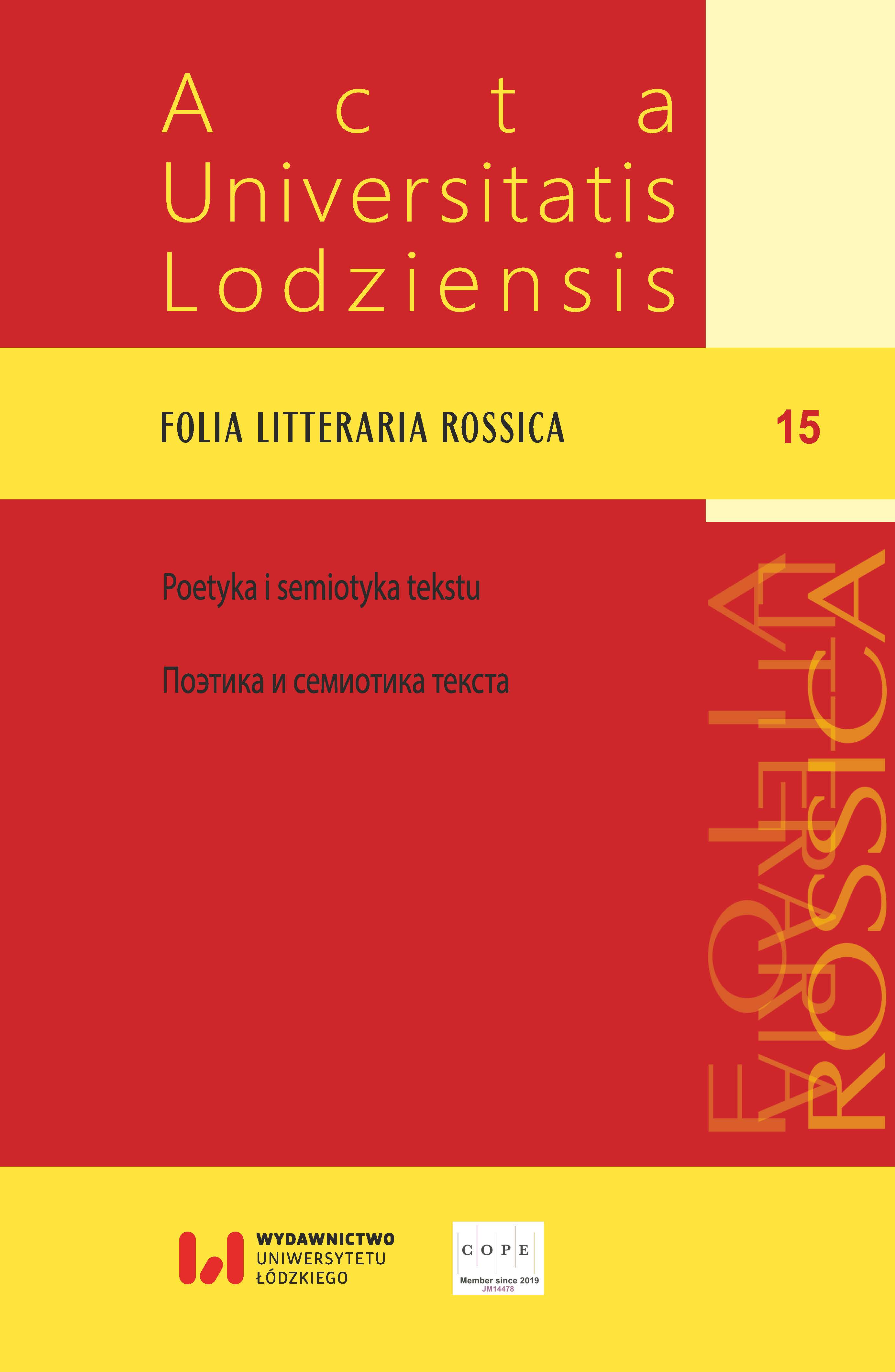The Poem “Semiramis” by Nikolay Gumilev as a ‘Curtailed’ Lyrical
DOI:
https://doi.org/10.18778/1427-9681.15.09Keywords:
Nikolay Gumilev, female principle, title, lyrical narrative, mythopoetics, SemiramisAbstract
The article deals with the poetics of the poem “Semiramis” (1909) by Nicolay Gumilev, included in his book of verses titled Pearls (1910). This text is one of the mythopoetic variants of the reflexive comprehension of death, forming the meaningful framework of Pearls and conceptualising the mythologeme of path-ascension to the true essence of the Universe. The title of the poem explicates the name of the heroine and defines the historical-mythological context of the simulated world. The “point of view” of Semiramis – i.e. the Assyrian queen who, according to myths, killed her husband tsar Nin for the sole power and became famous for creating the Babylonian hanging gardens – is the structural-semantic centre of the plot development in the Nikolay Gumilev’s text. The monologue of Semiramis is clearly anarrative in nature and determines the lyrical exploration of the natural and cultural space. However, the analysis of the poem shows that the self-presentation of the heroine appears to be a kind of a ‘curtailed’ lyrical narrative, in which the events are not stated, but are implied and require a reconstruction by the reader’s consciousness. The name of the queen, placed in the strong position of the title, and the actualisation of the realities of her mythologised life, imply a certain series of events that goes back to the mythological past of the Ancient East. The attainment of harmony and peace postulated by Semiramis, embodied by the hanging gardens created by her will, turns out to be illusory. The confirmation of the illusory nature of beauty and power comes in the form the heroine’s collision with the other world, personified in the image of “the moon”. This ontological conflict at the level of the poem’s plot is realised as an anarrative ‘ballade’, the structure of which separates the ‘curtailed’ narratives about the empirical (mythological) past of the heroine as well as the lyrical revelation about the catastrophism of her future. By ‘curtailing’ the narrative structure and reducing the event to a sign, Nikolay Gumilev’s poem “Semiramis” shows a special poetic experience of mythologising the relationship of a person with the world on the ontological axes ‘life – death’, ‘profane – sacred’, ‘earthly – otherworldly’.
Downloads
References
Akhmatova, Anna A. N. S. Gumilev – samyi neprochitannyi poet XX veka. In: Sobranie sochinenii: v 6 t. Vol. 5, ed. N. V. Koroleva. Moskva: Ellis Lak, 2001.
Google Scholar
Asoyan, Aram A. Semantika antitezy v poeticheskom mire Nikolaya Gumileva. In: Semiotika i metaforika khudozhestvennykh form. Sankt-Peterburg: Alethea, 2019: 307–313.
Google Scholar
Basker, Michael. Rannii Gumilev: put k akmeizmu. Sankt-Peterburg: Russkii khristianskii gumanitarnyi institut, 2000.
Google Scholar
Bobritskikh, Lyudmila Ya. “Syuzhetno-kompozitsionnye osobennosti ballad N. Gumileva”. Filologicheskie zapiski. No. 17 (2001): 252–259.
Google Scholar
Bryusov, Valerii Ya. Sobranie sochineni: v 7 t. Vol. 1, ed. P. G. Antokolskii. Moskva: Khudozhestvennaya literatura, 1973.
Google Scholar
Chizhikova, Anna A. Transformatsiya zhanra ballady v tvorchestve N. Gumileva (“Uzhas”, “Les”, “U kamina”). In: Materialy k slovaryu syuzhetov russkoi literatury: sbornik nauchnykh trudov, ed. E. K. Romodanovskaya. Issue 10: Liricheskie i epicheskie syuzhety i motivy v russkoi literature. Novosibirsk: Institut filologii Sibirskogo otdeleniya Rossiiskoi akademii nauk, 2012: 152–163.
Google Scholar
Сirlot, Juan E. Slovar simvolov: 1000 statei o vazhneishikh ponyatiyakh religii, literatury, arkhitektury, istorii, transl. F. S. Kapitsa, T. N. Kolyadich. Moskva: ZAO Tsentrpoligraf, 2010.
Google Scholar
Cooper, Jean. Entsiklopediya simvolov. Moskva: Zolotoy vek, 1995.
Google Scholar
Entsiklopedicheskii slovar Brokgauza i Efrona. Vol. 29. Sankt-Peterburg: Brokgauz – Efron, 1900.
Google Scholar
Filatov, Anton V. “Mifopoeticheskie strategii V. I. Ivanova i I. F. Annenskogo i formirovanie akmeisticheskoi mifopoetiki”. Vestnik Pravoslavnogo Svyato-Tikhonovskogo gumanitarnogo universiteta. Seriya 3. Filologiya. No. 55 (2018): 75–85.
Google Scholar
Genette, Gérard. Povestvovatelnyi diskurs. In: Figury: v 2 t. Vol. 2. Moskva: Izdatelstvo imeni Sabashnikovykh, 1998: 60–280.
Google Scholar
Gumilev, Nikolai S. Polnoe sobranie sochinenii: v 10 t. Vol. 1. Stikhotvoreniya. Poemy (1902–1910), ed. Yu. V. Zobnin, Moskva: Voskresene, 1998.
Google Scholar
Hansen-Lӧve, Aage. Russkii simvolizm. Sistema poeticheskikh motivov. Rannii simvolizm. Sankt-Peterburg: Akademicheskii proekt, 1999.
Google Scholar
Hyginus. Mify, transl. D. Torshilov. Sankt-Peterburg: Alethea, 2017.
Google Scholar
Kholl, Menli P. Entsiklopedicheskoe izlozhenie masonskoi, germeticheskoi, kabbalisticheskoi i rozenkreytserovskoi simvolicheskoi filosofii. Moskva: AST, Astrel, 2005.
Google Scholar
Lübker, Friedrich. Realnyi slovar klassicheskikh drevnostei, ed. F. Gelbke, P. Nikitin, M. Pustonskii, F. Zelinskii. Sankt-Peterburg: Obshchestvo klassicheskoi filologii i pedagogiki, 1885.
Google Scholar
Malykh, Vyacheslav S. “Poetika uzhasnogo i ‘strakh pustoty’ v rannem tvorchestve N. S. Gumileva”. Art Logos. No. 1 (1) (2017): 69–77.
Google Scholar
Mify narodov mira. Entsiklopediya: v 2 t. Vol. 2, ed. S. A. Tokarev. Moskva: Sovetskaya entsiklopediya, 1992.
Google Scholar
Nalegach, Natalya V. Poetika stikhotvoreniya N. Gumileva “Semiramida”. In: Russkaya literatura XX–XXI vekov: napravleniya i techeniya. Issue 9. Ekaterinburg: Uralskii gosudarstvennyi pedagogicheskii universitet, 2006: 24–39.
Google Scholar
Razumovskaya, Aida G. Sady rossiyskoi poezii (ot simvolizma do postmodernizma). Sankt-Peterburg: NP-Print, 2014.
Google Scholar
Shmid, Volf. Narratologiya. Moskva: Yazyki slavyanskoi kultury, 2003.
Google Scholar
Smelova, Marina V. Ontologicheskie problemy v tvorchestve N. S. Gumileva, monografiya. Tver: Tverskoi gosudarstvennyi universitet, 2004.
Google Scholar
Timofeeva, Elizaveta D. “Balladnye traditsii v rannei poezii N. S. Gumileva”. Vestnik Pravoslavnogo Svyato-Tikhonovskogo gumanitarnogo universiteta. Seriya 3. Filologiya. No. 58 (2019): 11–23.
Google Scholar
Tyupa, Valerii I. Diskurs / Zhanr. Moskva: Intrada, 2013.
Google Scholar
Downloads
Published
How to Cite
Issue
Section
License

This work is licensed under a Creative Commons Attribution-NonCommercial-NoDerivatives 4.0 International License.












